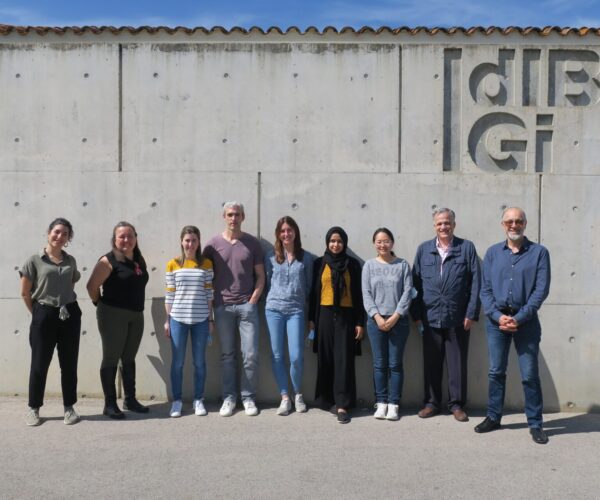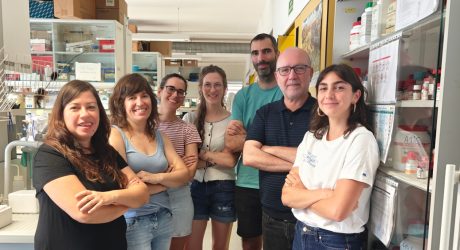The cross-border THINKGUT project about intestinal microbiota comes to an end
• The results of the project include advances in the design of personalized microbiome-based tools focused on preventing, diagnosing and treating neurocognitive disorders associated with ageing and obesity.
• The THINKGUT project has also made it possible to train specialists in the interrelationship between the microbiota and cognition.
• The consortium driving the initiative includes, in addition to IDIBGI, the INSERM Institute and the PYME Enterosys SAS, and has been co-financed by the European Regional Development Fund (ERDF) through the POCTEFA program.
The THINKGUT research project, which has studied the role of the intestinal microbiota in neurocognitive disorders associated with old age and obesity, ends. This cross-border project has led to advances in the cross-border territory in the design of personalized diagnostic-therapeutic tools based on microbiome focused on preventing, diagnosing, and treating neurocognitive disorders associated with aging and obesity. Thanks to the project, specialists have also been trained in the interrelationship between the microbiota and cognition. These are two of the main results of the project, led by the Girona Biomedical Research Institute (IDIBGI) and with the participation of the French partners, Institut National de Santé Et de la Recherche Mèdicale (INSRERM) and PYME Enterosys SAS.
The prevalence of neurodegenerative disorders is among the greatest current threats to aging in the European Union. Obesity is known to have effects on neurocognition and gut microbiota composition. Moreover, the microbiota is also an important and under-recognized element in neurocognitive dysfunction in old age.
THINKGUT has focused on three specific objectives corresponding to the biomedical, biotechnological, and educational areas. Thanks to the project, a cross-border repository has been built from the anonymized data on microbiota and cognition of approximately 1700 individuals, and a cross-border consortium of experts in the areas of obesity, microbiota, and cognition has been established, who will use the repository and bioinformatics and biomathematical models to identify the bacteria that interact with the gut microbiota-brain axis and their impact on neurocognitive decline.
Functional assays have also been performed in mice colonized with human intestinal microbiota from different groups of individuals with and without obesity, in which extensive neurocognitive dysfunctions have been studied after fecal transplantation.
In addition, the project has focused on the training of specialists, within the cross-border territory, in the interrelation between microbiota and cognition. In this sense, training efforts have been directed toward doctoral, master’s, and bachelor’s degree programs, as well as toward vocational training and high schools.
“ThinkGut has allowed us a more intensive collaboration and strategic synergies between research centers-companies in the cross-border territory and the results of the project will help us to build tools for the prevention, diagnosis, and treatment of neurocognitive disorders associated with advanced age and obesity,” says the project coordinator, Dr. José Manuel Fernández-Real, head of the Nutrition, Eumetabolism and Health group at IDIBGI and researcher at CIBEROBN Fisiopatología de la Obesidad y Nutrición (Instituto de Salud Carlos III).
“ThinkGut has contributed to the development of innovative models in humanized mice aimed at identifying new biomarkers for research into the generation of new drugs, as well as to the cross-border training of multidisciplinary specialists in gut microbiota-cognition interrelationships,” explains Dr. Rémy Burcelin, Research Director at INSERM.
For his part, Jean-Christophe Malrieu, CEO of Enterosys SAS, states that “ThinkGut has allowed us to advance the internationalization of Enterosys as a biotech company involved in developing therapies based on human microbiota models.“
About the POTECFA program
The THINKGUT project “Personalized prediction of cognition through human microbiota,” which has been co-financed by the European Regional Development Fund (ERDF), has ended this April and had a total budget of 1.3 millios euros.
THINKGUT has been 65% co-financed by the European Regional Development Fund (ERDF) through the Interreg V-A Spain-France-Andorra Program (POCTEFA 2014-2020). The objective of POCTEFA is to strengthen the economic and social integration of the Spain-France-Andorra border area. Its assistance seeks the development of cross-border economic, social, and environmental activities through joint strategies in favour of sustainable territorial development.
Cross-border cooperation is crucial to obtain information and compile cohorts from clinical centers in the POCTEFA territory into a repository, allowing the development of therapies and drugs to prevent obesity, metabolic diseases, and neurocognitive impairment in aging.
THINKGUT – Personalized Prediction of Cognition through the Human Microbiota. (EFA345/19).
The Thinkgut project has been co-financed 65% by the European Regional Development Fund (ERDF) through the Interreg V-A Spain-France-Andorra Program (POCTEFA 2014-2020). The objective of POCTEFA is to strengthen the economic and social integration of the Spain-France-Andorra border area. Its assistance focuses on the development of cross-border economic, social and environmental activities through joint strategies in favour of sustainable territorial development.




